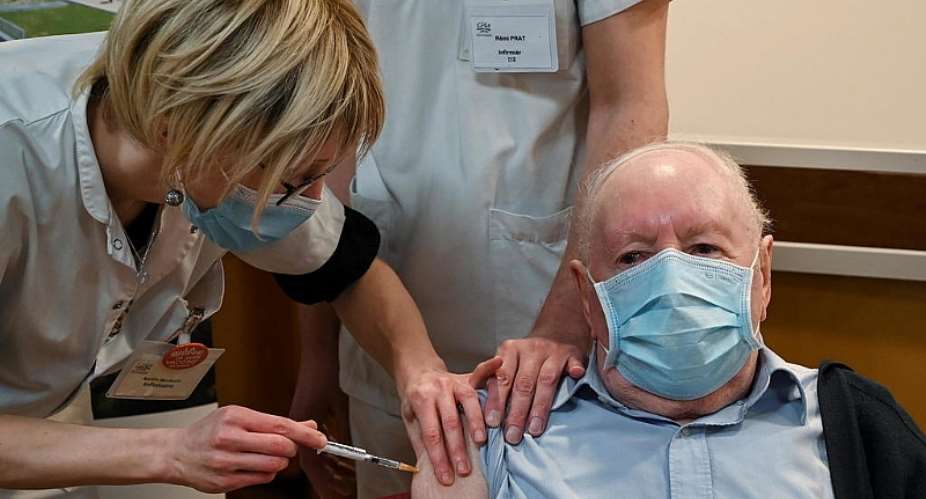Europe has launched a mass COVID-19 vaccination drive with pensioners and medics lining up to get the first shots to see off a pandemic that has crippled economies and claimed more than 1.7 million lives worldwide.
“We have a new weapon against the virus—the vaccine,” tweeted French President Emmanuel Macron on Sunday, in a country (fifth highest cases in the world) where only 40 per cent of the population intends to get vaccinated. This according to a survey by the National Public Health Agency.
Faced with high levels of hesitancy towards the vaccine, European leaders are promoting it as the best chance of getting back to something like normal life next year.
Swedish Prime Minister Stefan Lofven described the vaccine as a "ray of light in the darkness".
The 27 member-states of the European Union are due to receive 12.5 million vaccine doses by the end of the year, enough to vaccinate 6.25 million people based on the two-dose regimen.
The companies are scrambling to meet global demand and aim to make 1.3 billion shots next year.
EU has secured contracts with a range of drugmakers besides Pfizer, including Moderna and AstraZeneca, for a total of more than two billion vaccine doses and has set a goal for all adults to be inoculated during 2021.
Delays
Distribution of the shot presents tough challenges as the vaccine uses new mRNA technology and must be stored at about -70 degrees Celsius (-112°F).
In Germany, the campaign faced delays in several cities after a temperature tracker showed that about 1,000 shots may not have been kept cold enough during transit.
This in turn postponed the delivery of a new batch of the coronavirus vaccine to Spain by one day to Tuesday.
The Pfizer shots being currently used in Europe were shipped from its factory in Puurs, Belgium, in specially designed containers filled with dry ice. They can be stored for up to six months at -70°C, or for five days at 2°C to 8°C, a type of refrigeration commonly available at hospitals.
In Italy, solar-powered healthcare pavilions were set up in town squares as the vaccination drive kicked off.
Nightmare not over
But the introduction of the vaccine worldwide is far from the end of the crisis. In a bleak assessment, top US government scientist Anthony Fauci warned Sunday that “as we get into the next few weeks, it might actually get worse”.
A new strain of the virus that emerged in Britain has already reached several countries.
Cases of the UK variant have been detected in Australia, Hong Kong, Japan, Canada, Jordan, South Africa and in Europe, mostly recently in Sweden, France, Norway and Portugal's island of Madeira.
So far, scientists say there is no evidence to suggest the vaccines developed will be any less effective against the new variants.
The new strain -- which experts believe is more contagious -- prompted more than 50 countries to impose travel restrictions on the UK.
Echoing concerns from officials across the continent, Health Minister Olivier Veran said France has not ruled out imposing a third nationwide lockdown if coronavirus cases continue to rise after the holiday season.
He said it would become clear in the next months if the vaccine might not just stop people falling sick but also prevent the virus from being passed on.
A defence council headed by President Macron will be held on Tuesday to assess the situation in the country.
The mayor of the eastern city of Nancy said that a local lockdown is “inevitable” in the Northeastern region of France.
Mathieu Klein said that he is most worried about the situation in hospitals.
“The rate of Covid contamination has considerably increased in the last 15 days,” he said. "We need vaccination as quickly as possible and at a faster rate."





 Take IPAC relationship seriously to avert repetition of voter transfer challenge...
Take IPAC relationship seriously to avert repetition of voter transfer challenge...
 “We've economic challenges, power outages but not consumed” — Afenyi-Dadzie
“We've economic challenges, power outages but not consumed” — Afenyi-Dadzie
 Retract, apologise over Labadi beach front claims — Freddy Blay to Ablakwa, John...
Retract, apologise over Labadi beach front claims — Freddy Blay to Ablakwa, John...
 Ghana bleeding terribly — Mahama reacts to death of abandoned patient
Ghana bleeding terribly — Mahama reacts to death of abandoned patient
 S.Africa's Ramaphosa to announce 'inclusive' coalition cabinet
S.Africa's Ramaphosa to announce 'inclusive' coalition cabinet
 Dumsor: There would be lot of inconsistencies if we prepare a timetable — ECG Bo...
Dumsor: There would be lot of inconsistencies if we prepare a timetable — ECG Bo...
